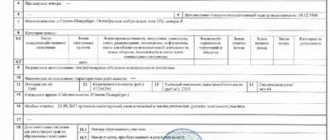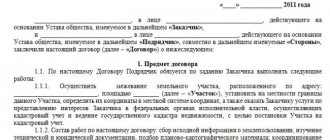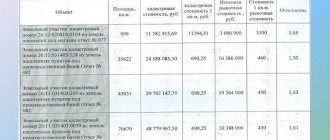After acquiring land, it is necessary to obtain title to the land plot in order to officially confirm the status of its owner. If this is not done, then any further actions with the site, such as its sale, inheritance, etc. will be impossible.
The registration procedure is not complicated once you understand it. Therefore, let's look at where to start registering land ownership.
Registration of land ownership in 2021: changes and amendments to legislation
Back in 2018, some changes came into force that relate to the process of registering a land plot as a property. In accordance with the updated rules, owners of garden and dacha lands that were acquired for long-term or indefinite use are required to register the plot in the state cadastre. To obtain ownership rights, you need to request an extract from the Unified State Register of Real Estate. The rules for carrying out this procedure and norms can be found in Law No. 218-FZ “On State Registration of Real Estate”.
Land plot
The rented plot can be transferred to private ownership in accordance with Federal Law No. 178-FZ “on the privatization of state and municipal property dated December 21, 2001, and you need to pay attention to the changes and additions that came out in 2017. And if you turn to the law, you can find out that the lease agreement will not be an obstacle to the purchase of the land plot.
What does the document look like?
The form is approved by the normative act of the local administration. The old document (1992) is blue. Consisted of one page displaying information about the site. Designed by hand.
In 1995, the certificate was replaced - it became pink and consisted of two joined sheets. The document included information about the land and information about the owner of the land plot, his passport details. Existed until 2021.
Next, they began issuing an extract from the Unified State Register of Rights to Real Estate (USRE).
Contains complete information about the allotment:
- cadastral number;
- location;
- square;
- category of land;
- presence (absence) of encumbrances.
A separate section of the extract includes a site plan and its cadastral number. Issued in paper or electronic form. The extract contains information about the owner of the land plot and the grounds for his rights.
Reference! From January 2021, extracts from the Unified State Register are issued. They are legal and carry certain information. The second type can be requested by any citizen. The extract contains the same information as in the certificate.
Includes 3 sections:
- detailed information about the site (address, postal code, area, intended purpose, cadastral number, cost, etc.);
- data on the rights to own and use the land plot (full name of the owner or name of the organization, method of obtaining the right, presence of encumbrances, data on the seizure of the territory for the needs of the state);
- detailed information about the location of the allotment (postal address, land surveying scheme).
The extract is issued in paper and electronic forms - both have legal force. There is no seal on the electronic version; it is replaced by the employee’s electronic digital signature.
Note! The security mark on the certificate is not a mandatory requirement - it does not affect the legal significance of the document.
What documents are needed to obtain ownership of a land plot?
In the basic list of documents you can find:
- Application to register ownership;
- Cadastral passport of the land plot;
- The original and also a copy of the passport of the owner of the land plot;
- A document evidencing the purchase of a land plot.
Depending on how the property will be obtained, you can select some documents that will confirm the ownership of this plot:
- Contract of sale;
- Certificate of entry into inheritance rights;
- Privatization Act;
- Deed of gift, as well as other documents.
Registration for purchase and sale
When registering a land plot that was acquired during the purchase and sale process, in addition to other documentation, you must have:
- a notarized purchase and sale agreement, which confirms the validity of the transaction;
- documents identifying the seller and his right to the land plot sold.
Then the buyer, when contacting the registration authority to secure his ownership rights to the acquired plot, must provide:
- the applicant's identity card;
- contract of sale;
- an extract from the Unified State Register of Real Estate showing the cadastral plan;
- a receipt certifying payment of the state duty.
Registration of land ownership: step-by-step instructions
Step one: state registration
- First you need to go to the Rosreestr office located in your area
- Then you need to fill out an application that will be given to you at the department
- Submit an application with a package of documents
- Pay the state fee
- Pick up the extract on the date indicated by the specialist
Step two: registration through the MFC
- You need to supplement your existing documents and declarations of all buildings that are on this land plot
- Contact the Russian Register or MFC located in your area
- Pay the state fee
- Sign the application that will be issued to you by the MFC specialist
- Receive a receipt of the petition before submitting documents
- Pick up the certificate on the day indicated on the receipt
How to register ownership of land that was inherited: features and rules
If you turn to legal norms, you can find out that the heir has half a year to register ownership of the land. First you need to go to a notary and submit an application to accept the inheritance. After the lawyer has accepted this application, he will provide a list of documents that you need:
- At the cadastral chamber you will need to take an extract from the land cadastre, take a passport of the plot, which will indicate the market price, a certificate about the real estate on the plot, as well as an extract to become an heir;
- At the passport office you will need to get a certificate from the place of registration, a document that will confirm the degree of relationship with the testator;
- You will need to get a certified will from a notary.
There is a list of non-standard situations during inheritance, as well as documents that you may need/will need:
- If the testator inherited land, then an extract from the tax office is required;
- If the property is part of a dacha cooperative, then you will need the charter of the cooperative; this document can be issued at the tax office at the location of the site;
After all the documents have been received and submitted, you need to wait half a year, and only then register ownership. This procedure can be carried out at the Rosreestr branch; there is a special list of documents for state registration:
- Heir's passport;
- Certificate that the testator has died;
- Certificate of inheritance, which must be certified;
- Object passport;
- A receipt indicating that the state duty has been paid.
Useful video
The five-minute consultation presented by the cadastral engineer is mostly devoted to explaining why state registration of real estate is worth going through. After all, there is a clearly evident trend of tightening legislative norms. Geodetic organizations provide some assistance in formalizing the official ownership of real estate, ensuring the receipt of technical documentation.
A 6-minute video is devoted to how to register a plot of land through the offices of the MFC or Rosreestr. All aspects related to the procedure are considered consistently and with appropriate attention to detail.
How to act in unusual cases
If the plot was acquired before 2001.
In 2001, some changes were made to land legislation. If the land was purchased earlier, but the rights were not registered at the same time, then before contacting the Rosreestr and the MFC, you need to make a cadastral passport. When applying for a cadastral passport, you must submit an application and pay for the work of a cadastral service specialist. This procedure can only be carried out on a site with land surveying; a passport is issued within 10 days. However, in some regions and when the registrar is busy, the waiting time may be longer, in which case it will be negotiated on an individual basis.
If there is no land survey
Land surveying is the definition of the boundaries of a site by a regulatory legal act. Thanks to this procedure, the possibility of disputes between neighbors will be excluded; it is needed in order to formalize ownership of a land plot. If land surveying has not been carried out on your site, then you can formalize this procedure at any company that has done land management work. To draw up a boundary plan, the company:
- Will collect and analyze all geodetic data, as well as maps of the area;
- Draw up a site plan;
- Highlights communications and other objects on the site on the plan;
- Draw up a boundary plan in accordance with all existing standards.
To complete the survey, you need to submit a plan, a copy of your passport, and a document confirming the right of ownership to the cadastral chamber. In addition, you need to pay for the registration service.
And if we talk about practice, it takes approximately half a year to survey and obtain a cadastral passport.
If there are no documents confirming the ownership of the land plot
If a document on entering into an inheritance, a certificate of purchase and sale, a deed of gift or another document is missing, lost, or drawn up with errors, then it must be reissued before the registration procedure. The plan will depend on the specific case:
- If the original documents have been lost, then you need to contact the relevant authorities and make a duplicate of the document there;
- If there are errors and inaccuracies in the purchase and sale agreement, then you need to contact the seller and re-conclude the deal, and you must comply with absolutely all norms and laws;
- If the land was registered as a property according to already outdated standards, and the only documents available are a membership book, then it is necessary to go to court and legalize the transaction with the help of the court;
- If the plot was acquired as a part of a horticultural society, then it is necessary to carry out general privatization procedures and allocate your part of the property.
You should be aware that when purchasing a plot of land, you should obtain a certificate from the seller stating that there is no encumbrance on the plot, for example, that the territory is not collateral. If the territory acts as collateral, then the transaction without the permission of the pledge holder will be unlawful. All data can be clarified in a unified register of rights, access to it is general.
The nuances of obtaining a certificate in the absence of papers
In the absence of documents, you can register ownership of the plot by legalizing the buildings. If there is a house on the site that is the property of the applicant, a certificate of ownership of the house serves as confirmation of the right to the land.
If the plot is a dacha plot, the privatization process should begin with land surveying . Next, the boundaries are agreed upon with the neighbors, and a boundary plan is submitted to Rosreestr. Registration of a building as a residential one will be possible only on a garden plot; this is prohibited on garden plots.
To register rights to the land under the garage, you must send an application for bidding to the administration, paying 10% of the cost of the plot. If you win, pay the remaining 90%.
More information on the issue can be found at the link.
How to become the owner of a leased territory
Back in 2001, the new land code of the Russian Federation came into force; it states that citizens can be the owners of territory that is under permanent or fixed-term lease. If the territory of a given land plot was allocated according to the legislation of the USSR and used for residential construction, then the right of ownership can be registered completely free of charge. You can only take advantage of this benefit when:
- Built and became the owner of a country house, garage, bathhouse or outbuilding;
- They built and put into operation, and also became the owner of a private house;
- Enter the gardening cooperative.
Until the end of 2021, members of gardening partnerships and cooperatives could complete the registration procedure in a simplified manner.
The following citizens are entitled to receive a free plot of land:
- Disabled people;
- Veterans of the Great Patriotic War;
- Orphans;
- Large families;
- Military personnel who served for more than 10 years;
- Employees of internal affairs bodies with more than 15 years of work experience;
- Young professionals who are in agriculture;
- All other beneficiaries.
If the plot has not yet been developed, you will have to pay its average market price.
Register an allotment for only 350 rubles
It is possible to do without extra costs, but this only applies to a rather narrow range of cases. A common option that citizens apply to when registering land ownership, when there is a certificate of the right to lifelong inheritable and permanent ownership of land (PNV). It is not enough to complete a purchase and sale transaction. It is necessary to register ownership according to the new laws.
Registration of land ownership is not always expensive
The big advantage of this case is that land surveying is not necessary here, and, consequently, costs are significantly reduced: the approximate cost of the necessary land surveying work ranges on average from 10 to 30 thousand rubles . Therefore, the question of how much it costs to register a plot of land will not frighten the owner with large numbers.
See also: Catalog of the most popular plots in the Moscow region intended for the construction of suburban real estate.
Procedure
Before registering ownership of a land plot, you must submit an application to the authorities that own this territory. An extract from the cadastral plan of the territory must be attached to this application. It takes 14 days to resolve this issue, then, depending on the situation, the following solution can be determined:
- The site will be given ownership free of charge, and written permission for this operation will be issued;
- The opportunity to purchase this land plot may be provided, and a purchase and sale agreement may also be submitted for consideration. Registration can be carried out only after you pay the redemption price of the land plot;
- If you do not have the right to become the owner of this land plot, your application will be denied.
You should be aware that owners of private houses built on municipal territory will have an advantage when registering ownership of the site. The law provides several reasons for this. For example, if the land is not used for its intended purpose, if the house is located on a plot intended for agricultural work. At the same time, a situation may arise in which a site located beyond the border of the nearest populated area is used for construction. If the situation is different, your request will most often be granted.
After the municipality has issued its decision, the following documents should be collected to formalize ownership of the leased territory:
- Application for registration;
- Your passport;
- Municipal permit or purchase and sale agreement;
- A receipt stating that the state duty has been paid;
- Extract from the cadastral plan.
What to do if you are refused?
Sometimes an applicant receives a refusal to register a land plot already at the stage of receiving documentation. Such precedents arise under the following conditions:
- the application was submitted by an inappropriate (incompetent) person;
- the authenticity of the documentation presented is questionable;
- the submitted document is in an invalid form;
- The application does not contain the required information.
Such a refusal is accompanied by consultation with a specialist. He gives instructions on the required corrections. After correcting the violations, the documentation is submitted again.
Other situations of refusal may be initiated either by the administration of Rosreestr or by one of the parties to the transaction. In the first case, the reason may be a discrepancy between the information provided and the information stored in the information bank of the State Property Committee. Such cases require consideration, both in the interests of the registering institution and in the interests of the owner. After correcting the violations, for which one month is allowed, the procedure will continue. Otherwise, the issue must be resolved in court.
If the suspension of the procedure was initiated by a party to the transaction , its termination will require a court decision, on the basis of which the restitution of the transaction can be carried out, that is, its cancellation. In this case, it is necessary to prepare an evidence base on the indisputability of the transaction, confirming the good faith of the intentions of the interested party. If there is no appeal to the court, the accounting work on the application will continue in a month.
This issue is covered in more detail in the article: How to recognize land ownership through the court?
How to become the owner of ownerless land
There are two options by which you can be the owner of an ownerless plot. The most common way is to find the owner of a given plot and buy the territory. If you need to carry out this procedure as quickly as possible, you can contact the relevant authorities with your question, they will help you find the owner’s information.
If you still have not found the owners of the site, it may take several years to resolve the issue. To take ownership of ownerless land, you will need to do the following:
Contact the government agency and submit a petition. You must also add a copy of the appeal to local government authorities to your application. This way, your search for the owner of this site will be confirmed. After the results of the petition, the relevant authority will establish the site for cadastral registration for a period of one year. This is required so that the owner or the owner’s heirs can challenge the petition.
Then, after one year has passed, the commission will refer this case to the court. If after the court hearing it is proven that the property is ownerless, it will be transferred to the ownership of the municipality.
Then you can purchase this plot for rent.
It will be necessary to collect and order the development of all the required documentation, a master plan will be needed, a geodetic plan from a geodetic company, a statement that the land will be transferred into ownership, this statement must be submitted to the district administration, a cadastral passport of the site will also be required.
The entire package of documents must be submitted to the relevant authorities. It will take about three months to review your application.
If the municipality issues a positive decision, then you will be able to buy this plot at the average market value.
Next, after you sign the purchase and sale agreement, it will be possible to carry out land surveying and register this land through the Russian Register.
How much does it cost to register land ownership?
There are two mandatory fees in registering property rights: payment for the state registration process and state duty for the MFC.
If we talk about the cost of registration in the state register, it will be 2000 rubles. for citizens, if the plot is registered as ownership under individual housing construction, or 22,000 rubles. for organizations. The amount of the state duty will depend on the purpose of the territory, the owner and the documents that are the basis for obtaining the right of ownership. A duty will also be charged on the land, its size will depend on the family relationship with the testator, this is 0.3 percent of the assessed value of real estate for close relatives, but this amount cannot exceed 100,000 rubles, as well as 0.6 percent of the value territory for 2nd line relatives, this amount can be no more than 1,000,000 rubles.
If the original certificate of ownership is lost, then you will also have to pay to obtain a duplicate; individuals will pay 350 rubles, and legal entities will pay 1000 rubles.
In the process of collecting documents, it will be necessary to pay for the work of research and design bureaus. To compile a relief map, you will need a geodetic survey, its price will vary from 8,000 rubles. up to 15,000 rub. The design of the plan will be handled by the architecture department and the federal agency's real estate certificate. To determine the boundary and conduct land surveying, you need to pay for the services of a survey agent or land management company; you need approximately 5,000 to 9,000 rubles. The whole procedure requires not only financial costs, but also time. If you carry out the entire process correctly, eliminating absolutely all errors and inaccuracies as much as possible, then it will take up to three months.
If you do not want to waste your time and effort to prepare all the necessary documents, then you can contact a special office that can register the plots as private property. Also, specialists will accompany you all the time, they will check all the possibilities. You will need to provide personal information and make a notarized power of attorney for the company. The services of such a company will cost 10,000 - 15,000 rubles. or more, the cost will increase if the territory you choose is required for doing business.
Land acquired by squatting
When there are no papers for real estate, such an allotment is classified as obtained by self-capture. Any actions in such territories are illegal and subject to administrative liability. But there are ways that will help legalize these lands, making them private property.
A private individual needs to complete a purchase and sale transaction. When the land belongs to SNT or municipal authorities, it is necessary to submit an application to purchase the property. In circumstances in which the plot is the property of the state, it can be put up for auction (previously, the citizen contacts the authorized organization with a message about the desire to obtain the land into private ownership).
Purchasing at an auction makes it possible to register the ownership of land according to the scheme already discussed.
Where to pay government services?
You can pay the state fee in one of the ways convenient for you. It is possible to pay via the Internet; to do this, you need to fill out a special form on the official website, register, enter your passport data, recipient details, and select the type of duty. You can also pay for services at the bank’s cash desk; on the receipt you can find all the necessary details; the receipt will be given to you by the relevant authorities;
You can pay the state fee using the terminal; a receipt is also required for this. You can also contact the nearest one to you.
When you have already paid the state fee and suddenly change your mind about registering ownership of the land, the state will return you 50% of the money you contributed. If you overpaid, the difference will be refunded in full. To receive a refund, you must submit an application to the registration authorities.
How to save money when paying for registration services
To receive a discount when paying state fees, you can use a single portal of state, municipal and regional services to transfer money. Thus, you will save 30% of the cost. For example, if the payment is 2000 rubles, then in this way you will pay 1400 rubles. You will not only save money, but also time; it will take not nine days, but one working day.
The following lands can be transferred into ownership without state duty:
- State and municipal ownership;
- Areas intended for reindeer herding;
- Sites located on the territory of regions joining the Russian Federation;
- Preferential citizens;
- State authorities;
- Representative office of the Central Bank of the Russian Federation.
Moreover, the state duty may not be paid by those owners who are forced to go through the procedure for registering a land plot due to amendments to the legislation.
What lands are prohibited from being transferred into private ownership?
- Streets, embankments, squares, city parks and public gardens;
- Cemeteries, burial grounds and storage facilities for hazardous substances;
- Territories where nuclear energy facilities are located;
- Nature reserves, national parks, and other protected areas;
- Areas belonging to the armed forces of the Russian Federation;
- Exclusion near transport routes, airports and ports.
All restrictions can be found in Article 27 of the Land Code and Article 28 of the Federal Law of the Russian Federation. To check the status of the site, you need to contact the Rosregister.
Briefly about the main thing
The law on dacha amnesty, which appeared in 2006, and the articles of the Land Code of the Russian Federation, in force since 2015, significantly facilitate the process of registering territories for dacha ownership. The law on dacha amnesty, which appeared in 2006, and the articles of the Land Code of the Russian Federation, in force since 2015, significantly facilitate the process of registering territories for dacha ownership. The law on dacha amnesty, which appeared in 2006, and the articles of the Land Code of the Russian Federation, in force since 2015, significantly facilitate the process of registering territories for dacha ownership.
| A little more attention! Write in the comments what you think - does such bureaucracy simplify the life of the average citizen or is it done more for the convenience of public services? |
Ratings 0
Read later











